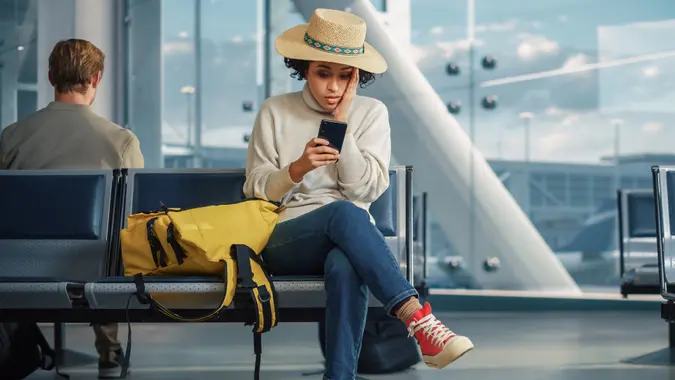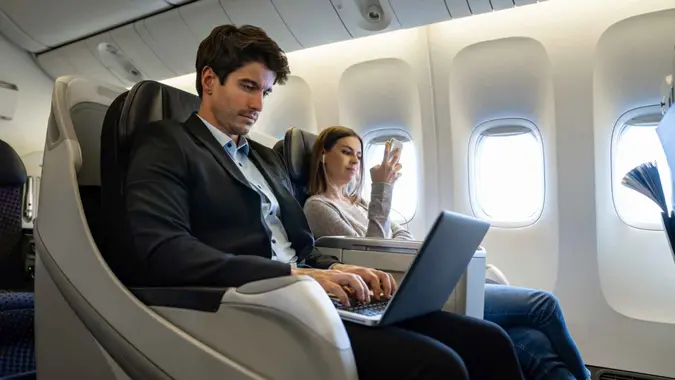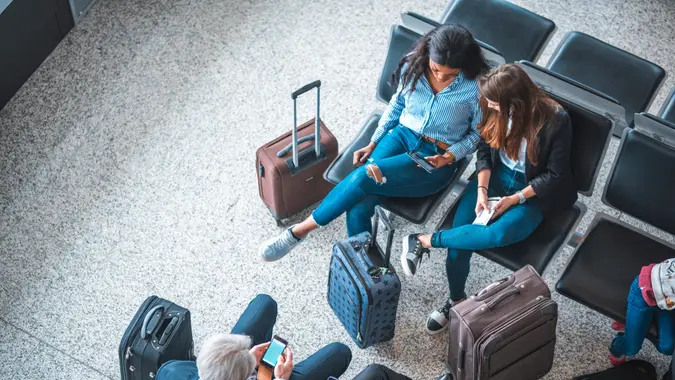How To Protect Your Credit When Traveling on Vacation

Commitment to Our Readers
GOBankingRates' editorial team is committed to bringing you unbiased reviews and information. We use data-driven methodologies to evaluate financial products and services - our reviews and ratings are not influenced by advertisers. You can read more about our editorial guidelines and our products and services review methodology.

20 Years
Helping You Live Richer

Reviewed
by Experts

Trusted by
Millions of Readers
Fraudsters were busier than ever during the pandemic, according to a 2022 FTC report, with a record 5.74 million cases of fraud and identity theft reported in 2021 alone. The previous record was broken one year earlier in 2020.
About 54,000 of those cases dealt directly with travel and vacations, with victims losing a combined $95 million. The median traveler lost $1,112 — although some victims never even got to travel and were scammed before they ever left the house thanks to deceptive offers for discount travel packages or similar scams.
Plenty of others, however, had their credit compromised while traveling overseas — in many cases, they didn’t realize that the damage had been done until after they returned home. If you’re venturing beyond America’s borders this summer, follow these tips to keep your credit safe and sound while you’re off seeing the world.
1. Freeze Any Cards You Won’t Be Using Before You Travel
Pack your wallet like you do your suitcase — with extreme care. According to Jason Glassberg, co-founder and managing principal of Casaba Security, you should freeze credit and debit cards that you don’t plan on using before you hit the road.
“If you are bringing multiple cards with you, you are increasing the risk of multiple account takeovers,” he said. “This will happen if you use multiple cards for in-store or online transactions while traveling, but even if you don’t use them, there’s always the possibility they could be lost or stolen.”
By freezing the cards you don’t need — which you can do simply by contacting your bank — you reduce the risk of identity theft.
2. Don’t Log In to Financial Accounts From a Wi-Fi Connection
You might be tempted to conserve data by connecting to wifi wherever you are overseas, particularly if the rates are higher where you’re headed. However, the safest bet for your bottom line is to use your phone’s network while traveling, said Glassberg.
“It is less common for us to see run-of-the-mill criminals using cellular hacking tools — most of them stick with wifi hacking because it’s far easier and cheaper to do so,” he said.
Best Buy recommends turning off not only wifi when traveling internationally, but file-sharing, as well.
In 2021, as international travel finally began to pick back up after the pandemic, PC World expanded on the concept by suggesting that travelers avoid hotel wifi altogether, even in the States. A good alternative is mobile tethering, and VPNs can add an extra layer of security.
3. Set Up Credit Alerts
You should alert your bank when you’re planning to travel overseas to avoid declined purchases, but some experts recommend taking it a step further. If you think your identity is vulnerable, consider setting up a credit alert with Experian, TransUnion or Equifax — when you create an alert with one credit bureau, it will pass your info along to the other two.
“Credit report alerts would benefit a traveler because they would know instantly or near to instantly if a fraudulent account was opened in their name and could resolve the issue quickly, versus finding out about the issue once they returned home from traveling,” said Harrine Freeman, financial expert and founder of H.E. Freeman Enterprises, a credit restoration company.
Forbes recommends always enabling text alerts from your bank before you travel whether you set up an alert or not.
4. Set Up a Dummy Email Account Before You Go
From hotels and guided tours to fellow travelers you meet on your journey, you’ll have no shortage of opportunities to give out your email address while traveling. It might seem harmless compared to your cell phone number, but sharing your email overseas could make you a target for phishing attacks, said Glassberg — and if you click the wrong link, phishing leads to malware and compromised accounts.
Consider setting up a separate account that you can give out safely before you go.
“This is what you use whenever you sign up for online sites or special deals, etc.,” said Glassberg. “With your primary personal email and work email, try to avoid publishing that online or using it to sign up for things unless necessary.”
Glassberg also recommends having an email solely for financial accounts. Keep this address private to avoid putting your private information — and credit — at risk.
5. Keep All Identifying Documents Close to the Vest
Carrying items that contain the data that identity thieves want when you don’t have to is just asking for trouble, according to Glassberg. This is especially true for your Social Security card, which you almost never need to carry with you. Instead, he recommends digitizing your card and uploading it to a secure email account so you can access it safely if you ever have to.
Don’t, however, get complacent with your other cards and documents that you do have to carry with you, even if they don’t seem as important as your Social Security card.
“If you lose your AAA card, loyalty card, birth certificate or passport, you can still become a victim of fraud,” said Freeman. “Thieves do not always need an SSN to commit fraud.”
6. Use Prepaid Cards
Unlike credit or debit cards, prepaid cards do not link to any personally identifiable information. That’s why using these cards while traveling helps eliminate identity theft because purchases are anonymous, said Freeman.
Along with limiting your credit risk, prepaid cards are more convenient than cash — think of them as modern traveler’s checks.
“You can purchase a prepaid card from a local retailer such as Target, CVS or a grocery store, or purchase a prepaid card online through major credit card companies such as Visa, MasterCard and American Express,” said Freeman.
Brinks has a highly rated prepaid Mastercard, as does PayPal, and the Travelex Money Card was designed specifically for international travel.
More From GOBankingRates
- Should You Buy Groceries at the Dollar Store?
- 5 Japanese Cars To Stay Away From Buying
- 16 Best Places To Retire in the US That Feel Like Europe
- 3 Things You Must Do When Your Savings Reach $50,000
Andrew Lisa contributed to the reporting for this article.
 Written by
Written by  Edited by
Edited by 

























